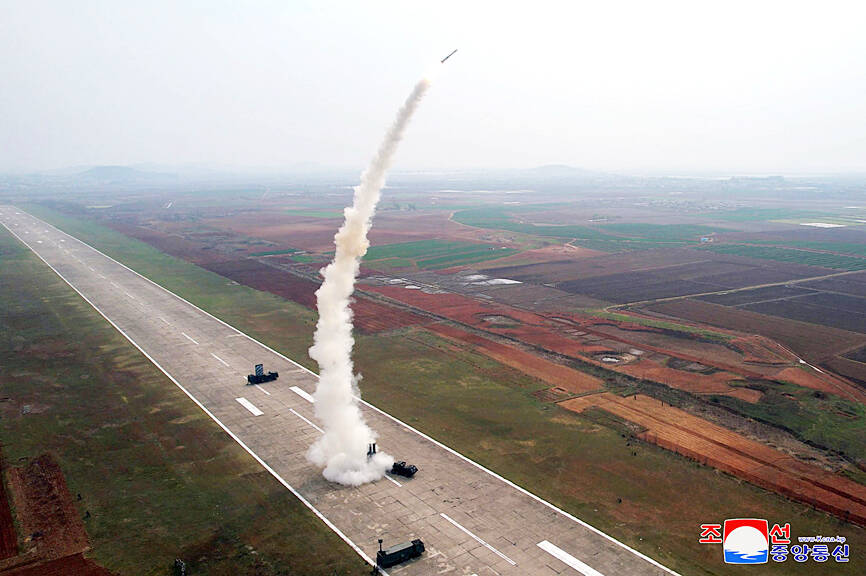North Korea has tested a “super-large warhead” designed for a strategic cruise missile, state media said yesterday, the most recent test since UN sanctions monitoring against the nuclear-armed nation was upended by Russia.
Russia last month used its UN Security Council veto to effectively end UN monitoring of violations of the raft of sanctions on Kim Jong-un’s administration for its nuclear and weapons program.
Analysts have said that North Korea could be testing cruise missiles ahead of sending them to Russia for use in Ukraine, with Washington and Seoul claiming Kim has shipped weapons to Moscow, despite UN sanctions banning any such moves.

Photo: KCNA via KNS / AFP
“The DPRK [Democratic People’s Republic of Korea] Missile Administration has conducted a power test of a super-large warhead designed for ‘Hwasal-1 Ra-3’ strategic cruise missile,” Korean Central News Agency said.
North Korea also carried out a test launch of a “’Pyoljji-1-2’ new-type anti-aircraft missile in the West Sea of Korea,” it said, adding that both tests were carried out on Friday afternoon.
Seoul’s military yesterday said it detected “several cruise missiles and surface-to-air missiles” fired toward the same body of water, also known as the Yellow Sea, at about 3:30pm on Friday.
It added that it was “closely watching” North Korean military activity, and if Pyongyang “commits a provocation, we will punish it overwhelmingly and resolutely.”
Ahn Chan-il, a defector-turned-researcher who is president of the World Institute for North Korea Studies, said that the test appeared to involve “a new type of solid fuel, and it seems to be part of the production of exports in response to Russian demand.”
Pyongyang said the tests were “part of the regular activities” of the country’s missile administration and had “nothing to do with the surrounding situation.”
A “certain goal was attained” through the tests, it added, without giving further details.

AGING: As of last month, people aged 65 or older accounted for 20.06 percent of the total population and the number of couples who got married fell by 18,685 from 2024 Taiwan has surpassed South Korea as the country least willing to have children, with an annual crude birthrate of 4.62 per 1,000 people, Ministry of the Interior data showed yesterday. The nation was previously ranked the second-lowest country in terms of total fertility rate, or the average number of children a woman has in her lifetime. However, South Korea’s fertility rate began to recover from 2023, with total fertility rate rising from 0.72 and estimated to reach 0.82 to 0.85 by last year, and the crude birthrate projected at 6.7 per 1,000 people. Japan’s crude birthrate was projected to fall below six,

Conflict with Taiwan could leave China with “massive economic disruption, catastrophic military losses, significant social unrest, and devastating sanctions,” a US think tank said in a report released on Monday. The German Marshall Fund released a report titled If China Attacks Taiwan: The Consequences for China of “Minor Conflict” and “Major War” Scenarios. The report details the “massive” economic, military, social and international costs to China in the event of a minor conflict or major war with Taiwan, estimating that the Chinese People’s Liberation Army (PLA) could sustain losses of more than half of its active-duty ground forces, including 100,000 troops. Understanding Chinese

US President Donald Trump in an interview with the New York Times published on Thursday said that “it’s up to” Chinese President Xi Jinping (習近平) what China does on Taiwan, but that he would be “very unhappy” with a change in the “status quo.” “He [Xi] considers it to be a part of China, and that’s up to him what he’s going to be doing, but I’ve expressed to him that I would be very unhappy if he did that, and I don’t think he’ll do that. I hope he doesn’t do that,” Trump said. Trump made the comments in the context

SELF-DEFENSE: Tokyo has accelerated its spending goal and its defense minister said the nation needs to discuss whether it should develop nuclear-powered submarines China is ramping up objections to what it sees as Japan’s desire to acquire nuclear weapons, despite Tokyo’s longstanding renunciation of such arms, deepening another fissure in the two neighbors’ increasingly tense ties. In what appears to be a concerted effort, China’s foreign and defense ministries issued statements on Thursday condemning alleged remilitarism efforts by Tokyo. The remarks came as two of the country’s top think tanks jointly issued a 29-page report framing actions by “right-wing forces” in Japan as posing a “serious threat” to world peace. While that report did not define “right-wing forces,” the Chinese Ministry of Foreign Affairs was